Renters and Consumer Law Addressing the Affordable Housing Crisis

Low- and moderate-income renters are facing tremendous economic challenges. In the last two years, as many as 15 million renters – 1 in 5 adult tenants in the United States – have
“Passing It Down”
An Interview with Shennan Kavanagh, NCLC’s Next Director of Litigation
Earlier this year, NCLC welcomed Shennan Kavanagh as our next Director of Litigation. She is co-leading NCLC’s Litigation Project alongside Stuart Rossman – the current Litigation Director and founder of the Project – and will succeed Stuart upon his retirement at the end of 2023.
Q: What started you on the path to becoming a consumer advocate?
A: I come from a family of people who dedicated their lives to helping others, and I went to law school to follow a similar path. It was there that I learned what consumer law was and how it could be used to help people and families find economic stability and well-being. I knew I had found what I was looking for.
fallen behind on their rent and have been at heightened risk of eviction. Rents are increasing relentlessly, making decent housing less accessible for many.
NCLC is fighting to protect renters from abusive practices employed by landlords, debt collectors, credit bureaus, and tenant screening agencies that put affordable housing even further out of reach. Consumer protection laws, such as the Fair Credit Reporting Act, the Fair Debt Collection Practices Act, and state and federal prohibitions against unfair and deceptive acts and practices, provide
tools to protect tenants. NCLC is working to leverage and strengthen those tools to help address problems that are systemic and widespread but disproportionately impact the most vulnerable people and families.
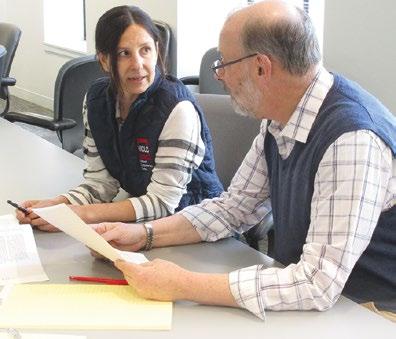
The credit reporting and tenant screening industries can create significant barriers to housing access for low-income renters. When landlords claim that renters owe them debts for back rent, broken leases, or damages to a unit, these debts often end up listed on renters’ credit reports, damaging their credit scores and impairing their ability to secure new housing. Tenant screening reports, produced by specialized screening companies, also make information, such
continued on page 8
Q: You come to NCLC with a wideranging background in consumer litigation. Can you tell us a little bit about your career before coming to NCLC?
A: Right after law school, I began taking on consumer cases for volunteer legal services organizations in Boston, through which I was also exposed to attorneys in private practice doing consumer class action lawsuits, including [NCLC Partners Council Member] John Roddy, Elizabeth Ryan, and [former NCLC advocate] Gary Klein, who were all part of the same firm. I joined their firm during the earliest years of the subprime mortgage crisis and litigated cases on behalf of homeowners – seeing for the first time how class actions can help bring justice for individuals and change within entire industries.
Eventually, I became a partner at the firm and learned about what it takes to build a successful consumer practice.
continued on page 9
INSIDE 4 Checking Up on the Medical Debt Epidemic 5 PROFILE Melissa Weiner: All In for the Fight 7 Updates from the NCLC Digital Library 9 Advocates Gather in New Orleans See inside for these stories and more!
Consumer Impact
SPRING 2023
Shennan Kavanagh (L) and Stuart Rossman (R)
Consumer Impact
is a biannual publication of the National Consumer Law Center to inform our supporters about NCLC’s advocacy. To receive Consumer Impact via e-mail, contact lhart@nclc.org
Facebook.com/ nationalconsumerlawcenter

@NCLC4consumers
linkedin.com/company/nationalconsumer-law-center

A Note from the Executive Director
Dear friends and supporters,
In these challenging times for low- and moderate-income people and families, NCLC continues working to provide the expert resources, training, and support that frontline attorneys need to effectively represent consumers.
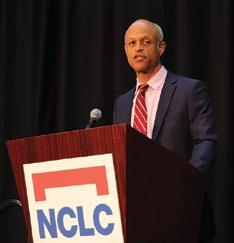
NCLC Partners Council
Leadership for NCLC
Elizabeth J. Cabraser, Chair
Bryan Kemnitzer, Chair Emeritus
Leonard Bennett
Robert M. Bramson

Bernard E. Brown
Mark A. Chavez
Michael D. Donovan
E. Michelle Drake
Cary L. Flitter
James A. Francis
Kristi C. Kelly
Keith Keogh
Steve D. Larson
Seth R. Lesser
Matthew P. McCue
Scott D. Owens
David J. Philipps
John Roddy
James C. Sturdevant
Beth Terrell
Janet R. Varnell
Hassan A. Zavareei
Last year we relaunched both our Digital Library and NCLC.org websites, and we’re already seeing the returns on those important investments. The NCLC Digital Library ( nclc.org/library) was used in over 480,000 sessions in 2022, with 325 chapters of our treatises updated last year. A powerful search engine and more than 1,600 resources were added to NCLC.org, and monthly usage increased by 50% after the upgraded site was launched last fall.
We hope you’re exploring these sites and finding these resources valuable in your practices. In this newsletter you’ll find summaries of some of the recent research and analysis you can examine in depth online, including reports on reverse mortgages, medical debt and its impact on credit reporting, and the role of “junk fees” in skyrocketing rents, among others.
These sites are one way in which NCLC informs our community; another is through our essential conferences and trainings. Over 300 attorneys just attended the 2023 Spring Training in New Orleans, the first event in the Consumer Law Educational Events Series produced jointly by NCLC and the National Association of Consumer Advocates (NACA). Coming up next in that series is the Summer Mortgage Conference , June 5–6 in Philadelphia. And this fall over 800 advocates will gather in Chicago for the 2023 Consumer Rights Litigation Conference and Class Action Symposium . We hope you’ll be among them!
In addition to updates on NCLC’s work, in this edition of Consumer Impact you’ll learn more about leaders in the consumer law community, including Melissa Weiner, Rand Bragg, Tara Twomey, Sarah Mancini, and NCLC’s next Director of Litigation, Shennan Kavanaugh.
It’s people like those – and people like you – who continue to give me optimism despite the powerful opposition and difficult challenges we face.
Thank you for fighting together with NCLC for economic justice.
With best wishes,
Rich Dubois Executive Director
Consumer Impact 2
NCLC.ORG
NCLC has long provided technical assistance to state advocates on legislation across our issue areas. Through the NCLC Campaign for the Future, we have been able to create a state advocacy initiative to advance our priorities at the state level with an emphasis on promoting legislation that would have a strong economic and racial justice impact.
One area of initial focus at the state level is protecting wages and bank balances from seizure for old debts. Aggressive debt collection methods have a disproportionate impact on communities of color and can often push struggling families over a financial precipice.
The advocacy community has taken off running, introducing bills and ballot initiatives at an increasing pace over the past two sessions.
This work has included direct action by NCLC and retained contract lobbyists to help us play a leading role in proconsumer legislation. We have alerted state legislators about the necessity of protecting wages and bank accounts for low-income families and, with our allies, helped introduce new consumer protection bills. NCLC created spaces for advocates to share strategies and information and provided technical assistance, testimony, and materials –including NCLC’s No Fresh Start report, a 50-state evaluation of state debt collection exemption laws, the most recent edition of which can be accessed at nclc.org/no-fresh-start. The advocacy commun ity has taken off running, introducing bills and ballot initiatives at an increasing pace over the past two sessions.
Debt collectors are responding with strong opposition and by increasing the scope of their own coalitions, making these fights harder, even in more progressive states. In turn, we need to keep up the pressure by adding to our network of advocates working on
protecting wages and other assets from seizure. For information on how you can support the protection of working families from excessive wage and bank
balance seizure for old debts in your state, contact NCLC’s Michael Best at mbest@nclc.org n
State Advocacy on Protecting Wages and Bank Balances from Seizure Campaign for the Future – Moving Ahead
After a strong public launch at our 50th anniversary celebration, the NCLC Campaign for the Future hit a major roadblock – along with the rest of the world – when the COVID-19 pandemic reached crisis level just four months later.

In recognition of the pandemic-created challenges and uncertainty faced by many in our field, NCLC for the most part held back on new campaign solicitations during the last three years. But now that our country has been returning to a greater sense of normalcy, the Campaign for the Future is coming out of semi-hibernation – and we’re looking forward to talking with leaders in our community about joining the Campaign in the months ahead and continuing to build on its initial impact.
Over these last three years, NCLC has used the support of over 350 donors from the first wave of the Campaign to make new investments in a number of critical areas, including racial justice advocacy, increased state-level policy reform engagement, and guaranteed conference scholarships for all legal aid and new-to-practice private attorneys.
These investments are having an impact, and we are grateful to every member of our community who has supported the campaign to date to make them possible, including Campaign leaders, Nancy Barron and Bryan Kemnitzer. Thanks also go to Len Bennett, Rob Bramson, Elizabeth Cabraser, Mark Chavez, Mike Donovan, Cary Flitter, Jim Francis, Mark Mailman, John Soumilas, Robert Green, Joe Jones, Ben Wolf, Abbas Kazerounian, Robert Hyde, Mike Kazerouni, Kristi Kelly, Andrew Guzzo, Jon Kravetz, Seth Lesser, Matthew McCue, Nicholas Ortiz, Scott Owens, Andy Spanogle (1933–2020), Jim Sturdevant, Brian Wanca, and Hassan Zavareei.
And we hope YOU will consider joining those and other campaign and community leaders to help NCLC build a stronger consumer law community and advance economic justice through personal giving, successful cy pres nominations, and/or planned giving. If you’re interested in learning more about the Campaign for the Future, contact Paul Laurent at plaurent@nclc.org or visit nclc.org/campaign! n
3
Checking Up on the Medical Debt Epidemic

Momentum builds in the effort to keep medical debt off credit reports, but core issues still demand urgent solutions
As NCLC advocates documented in our 2019 report, Don’t Add Insult to Injury: Medical Debt & Credit Reports , overwhelming levels of medical debt have long been a persistent and dire problem – because of both the immense burden of the debt and the damage done by medical debt to consumers’ credit histories.
In Don’t Add Further Insult to Injury: Medical Debt & Credit Reports , NCLC re-examines the national medical debt landscape in 2023 in light of recent positive developments in government and industry that help reduce the medical debts listed on credit reports. Though important progress has been made, the report finds that core problems still must be addressed – in particular, the crisis of accumulated medical debt, which disparately impacts Black and Latino/Latina consumers.
Among other meaningful policy reforms, recent federal and state legislation has helped limit the amount of medical debts. In early 2022, Congress passed the No Surprises Act, which reduces the number of reportable debts for unanticipated out-of-network medical bills. Multiple states have also put tighter restrictions on medical debt reporting and collection. Within industry, the “Big Three” credit bureaus – Experian, Equifax and TransUnion – have adopted voluntary measures to cease reporting medical debt that is under $500 or that is paid, and to wait one year before reporting all other medical debt to give consumers time to resolve insurance and billing issues.
Yet, NCLC’s report also finds that consumers are still insufficiently protected from harm caused by medical debt reporting, or from the core of the crisis: at least $88 billion in medical debt remains on consumer credit records at last count, carried disproportionately by Black households. n
NCLC is fighting to advance comprehensive reforms to address these core issues. The report can be found at nclc.org/medical-debt-credit-reports/
Preventing Foreclosure and Preserving Housing Stability for Older Adults
Reverse mortgage servicing challenges threaten to displace many low-income seniors
For many older adults living on reduced incomes, keeping up with traditional mortgage payments simply isn’t sustainable. Reverse mortgages – loans backed by a home’s equity, with no monthly payments of principal or interest – are designed to allow older homeowners to age in place while eliminating the heavy burden of regular loan payments.
But reverse mortgages end in foreclosure too frequently, as revealed in NCLC’s report, Unmet Promise: Reverse Mortgage Servicing Challenges and How to Preserve Housing Stability for Older Adults . Informed by surveys of frontline housing advocates, Unmet Promise shows how a range of issues drives preventable reverse mortgage foreclosures, including property charge defaults, false claims of non-occupancy, and other servicing problems.
Read the full report here: nclc.org/unmet-promise
In the absence of reforms, reverse mortgage foreclosures threaten to displace many older Americans and to widen the racial wealth gap. Roughly 480,000 reverse mortgages are currently outstanding in the United States – a number expected to grow as baby boomers age. Black homeowners have historically taken out reverse mortgages at higher rates than other groups, and communities of color have been hit hardest by reverse mortgage foreclosures.
The federal government must work to prevent reverse mortgage foreclosures. The report recommends critical reforms that the Federal Housing Authority and the Consumer Financial Protection Bureau should take to reduce unnecessary reverse mortgage foreclosures. n
Learn more about our work in the fight to expand access to sustainable homeownership by visiting nclc.org/homeownership-foreclosure
Consumer Impact 4
Melissa Weiner: All In for the Fight

Melissa Weiner still remembers the interview process for her first job as a class action litigator and the memorable test that came with it: identify a product that seems falsely and illegally advertised and write a memo about why.
Coming from a law practice defending businesses, but seeking more meaningful work, Weiner found the task exciting. “I got very into it,” Weiner says. “In preparing this memo, I realized how horrifyingly blind I had been to the deception that exists in our marketplace.”
In hindsight, Weiner says, she realizes that this assignment wasn’t just an exercise; it was a test of her innate awareness of injustice when it happens and her passion for making it right. She aced the interview, passing the passion test with flying colors.
Since then, Weiner has been on a mission to fight corporate fraud nationwide. As a partner in the Minneapolis office of Pearson Warshaw, LLP, she brings high-impact class action suits against companies employing deceptive marketing and other abusive practices. She recently won a major settlement in a case challenging a company’s use of dubious advertising claiming that its products were “100% natural” and “clinically proven,” a pervasive marketing tactic.
Weiner credits her upbringing, particularly the influence of her father, with preparing her for life as a consumer advocate.
“My dad was always very entrepreneurial both in business and in finding ways to help the community,” Weiner explains. “Watching him, I think I internalized his entrepreneurial, problemsolving impulse and desire to help people, which are both important in class action work.”
Outside of her practice, Weiner serves as Chair of the Development Committee for a pro-consumer nonprofit. Despite a hectic travel schedule, she also doesn’t compromise on getting home for dinner with her husband and three young daughters, watching her daughter play soccer, or seeing them off to summer camp. “Being a woman can be challenging in this business,” Weiner says. “But I want to show my daughters that it is possible to be a loving and present mom and have a busy successful career, if that’s what they want,” Weiner says.
The settlement in her recent false advertising case yielded a significant cy pres award, which NCLC was nominated to receive. “NCLC’s advocacy for consumer protections against fraud and deception benefits us all, making NCLC a really good choice for this cy pres nomination,” she says.
When asked what her career might look like if she weren’t litigating, she replies, “I’ve never even thought about this question. I love that my work allows me to help change the world. I’m all in on what I do.” n
Class Action “Cy Pres” Awards Advance Consumer Justice
Cy pres awards, which use unclaimed or impractical-to-distribute funds from class action settlements to promote the core interests of class members, are an important source of funding for NCLC’s work to protect and advance consumer rights.
NCLC is a respected and effective recipient of cy pres awards, generally approved by courts after judicial review and consideration of our consumer law expertise and long track record of success. We are honored to have been nominated and approved for over 500 cy pres awards since 1996. n
If you are a class action attorney and have questions or would consider nominating NCLC to receive a cy pres award, please feel free to contact Paul Laurent at 617-542-8010 or development@ nclc.org . We’re here to help and are grateful for your consideration!
Consumer Impact 5
“Distributing unclaimed settlement funds to NCLC is clearly not just an appropriate cy pres/ next best use of the funds – it is the absolute best use of unclaimed funds.”
— Dave Philipps, Philipps & Philipps, Ltd.
Melissa Weiner and two of her daughters
Student Loans
NCLC is fighting to protect the transformational relief that the Biden administration’s student loan forgiveness plan promises to provide to millions of the most vulnerable borrowers. The plan has been challenged in two critical cases before the U.S. Supreme Court. NCLC student loan experts attended the oral arguments and assembled with allies on the steps of the courthouse at the People’s Rally in Support of Student Debt Cancellation. NCLC was also instrumental in promoting recent actions by the U.S. Department of Education, including its recent decision to give borrowers with loans in default a fresh start, protection from involuntary collections, and improved access to bankruptcy discharges. NCLC continues to advocate for long-term reforms of the student loan system through the recent submission of comments urging the Department of Education to strengthen the student loan safety net for low-income people by improving the income-driven repayment program.
Learn about discharging student loans in bankruptcy in a recently updated issue brief, New Process to Discharge Student Loans in Bankruptcy (March 2023): nclc.org/ discharge-student-loans
See more: nclc.org/issue/student-loans
Robocalls & Fraud
NCLC continues to lead the fight against illegal and unwanted calls and texts before the Federal Communications Commission (FCC). After NCLC and the Electronic Privacy Information Center published the comprehensive report Scam Robocalls: Telecom Providers Profit,


News and Analysis
explaining the causes for the explosion in these dangerous messages, the FCC adopted several of our recommendations. In addition, the FCC has recently issued comprehensive limits on non-telemarketing robocalls, such as debt collection calls, to residential lines in accordance with NCLC’s recommendations. The FCC has also responded to our prompting and by clarifying that consent to receive telemarketing calls is not valid if it is generated through a hyperlink to a long list of callers on a lead generator’s website, and is considering much stricter guidance. After a long wait, the FCC ruled that ringless voicemails are covered by the Telephone Consumer Protection Act, adopting NCLC’s analysis. NCLC continues to encourage the FCC to adopt aggressive standards to stop illegal calls and texts.
See more: nclc.org/issue/robocalls-fraud
Predatory Rent-a-Bank Lending

The Federal Deposit Insurance Corporation (FDIC) recently downgraded the Community Reinvestment Act (CRA) rating of Transportation Alliance Bank, which facilitates predatory “rent-a-bank” loans, giving it a low rating few banks receive. NCLC and our allies submitted comments urging the downgrade due to the bank’s actions in helping EasyPay Finance evade state interest rate limits with predatory loans at rates up to 189% APR. NCLC filed similar FDIC comments for the CRA examinations of rent-a-bank lenders FinWise Bank, First Electronic Bank, Capital Community Bank, and Republic Bank and Trust.
Read more on legal strategies to challenge rent-a-bank lending in our recent NCLC Digital Library article, New Angles in Challenging Rent-a-Bank Schemes (Feb. 2023), available at nclc.org/library-rent-a-bank


See more: nclc.org/issue/banking-andpayments
Homeownership & Foreclosure
NCLC cheered recent pro-consumer victories in our fight to protect
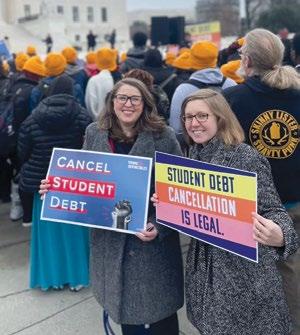
homeowners facing economic hardship, as well as those with limited English proficiency. After advocacy by NCLC and our allies, the Federal Housing Administration (FHA) announced that it will give all borrowers facing financial hardship (not just those with pandemicrelated hardships) access to foreclosure prevention tools developed in response to the pandemic. FHA also expanded the amount of payment reduction that can be achieved in a high interest rate environment by allowing loan modifications to stretch to as long as 40 years.
The Federal Housing Finance Agency recently adopted a change long urged by NCLC and our allies: requiring lenders selling loans to Fannie Mae and Freddie Mac to ask about the borrower’s preferred language. Collecting information on language preference is a first step to expanding language access.
See more: nclc.org/issue/homeownershipforeclosure
Junk Fees on Fintech Payday Loans, Credit Cards, and More
“Junk fees” are unfair and often hidden charges attached to various goods and services. These fees add little or no value to the consumer and often hit low-income consumers the hardest. Following advocacy by NCLC and our allies, California proposed to crack down on hidden costs on earned wage advances and other fintech payday loans, which disguise triple-digit interest rates in purportedly voluntary “tips,” instant access fees, and other charges. NCLC supports the CFPB’s proposal to reduce most credit card late fees to $8, urges the FTC to crack down on rental housing junk fees, and highlights junk fees in the carceral system, among other areas.
Read more about earned wage advances in our recent issue brief, Earned Wage Advances and Other Fintech Payday Loans: Workers Shouldn’t Pay to be Paid (March 2023), available at nclc.org/earned-wage
See more: nclc.org/fighting-junk-fees
Consumer Impact 6
NCLC’s policy advocacy and legal analysis cover every major area of consumer law.
NCLC Advocates Kyra Taylor (L) and Anna Anderson (R) at rally for student debt cancellation
Below are some additional recent highlights of our work supporting the consumer law community and fighting for economic justice.
Recent Practice Tools & Policy Resources
Practice Tools: Legal Analysis
3/23 The Latest Developments on Constitutionality of CFPB Regulations nclc.org/library-cfpb-constitutionality
3/23 New Supreme Court Ruling: When Is a Bankruptcy Debtor on the Hook for Partner’s Fraud? nclc.org/library-bankruptcy-debtor-fraud

2/23 New Angles in Challenging Rent-a-Bank Schemes nclc.org/library-rent-a-bank
1/23 Protecting Awards for Named Plaintiffs; Other Class Action Practice Tips nclc.org/library-protecting-awards
1/23 Year-End Review of 2022 FDCPA Appellate Decisions nclc.org/library-2022-review
1/23 New Consumer Laws Taking Effect in 2023 nclc.org/library-consumer-rights-laws
Policy Resources: Reports & Issue Briefs
3/23 Too Damn High: How Junk Fees Add to Skyrocketing Rents nclc.org/junk-fees
3/23 Earned Wage Advances and Other Fintech Payday Loans: Workers Shouldn’t Pay to be Paid nclc.org/earned-wage
3/23 New Process to Discharge Student Loans in Bankruptcy nclc.org/discharge-student-loans
2/23 Tariff-based On-Bill Financing: Assessing the Risks for Low-Income Consumers nclc.org/tariff-on-bill
1/23 How GSE Note Sales Undermine Homeownership nclc.org/gse-note-sales
12/22 No Fresh Start 2022: Will States Let Debt Collectors Push Families Into Poverty as the Cost of Necessities Soars? nclc.org/no-fresh-start
And that’s just the start! Visit nclc.org/our-work to learn more about our policy advocacy and resources or visit nclc.org/library to access cutting-edge analysis for practitioners.
News from the NCLC Digital Library
This spring brings three exciting new revisions to the Consumer Law Practice Series. Truth in Lending, Mortgage Servicing and Loan Modifications, and Home Foreclosures are all updated in print and available in continuously updated digital format on the new and improved NCLC Digital Library.
Truth in Lending, now in its 11th edition, is fully revised with extensive new case law and analysis on the Truth in Lending Act (TILA) mortgage servicing regulations, as well as TILA standing requirements after recent Supreme Court cases. This treatise, the most authoritative resource on TILA available, also contains TILA coverage of esoteric new “credit,” including income and equity share agreements.
The 2023 second edition of Mortgage Servicing and Loan Modifications includes a special new chapter covering mortgage protections involving natural disasters and epidemics. Already referenced by hundreds of advocates in its digital format, the new chapter covers homeowner rights both after natural disasters and new homeowner options exiting temporary COVID protections. Other new features include the latest on CFPB regulations on streamlined loss mitigation options and guidance on how to handle loan modification negotiations.
Home Foreclosures , 2023 second edition, updates the definitive text on all aspects of home foreclosure, including new discussions of zombie second mortgages and new information on statute of limitations defenses to foreclosure. COVID-related foreclosure issues are thoroughly examined, as is the Merrill doctrine as a defense for government agency loan owners. n
These new editions, and the 18 other titles in the Consumer Law Practice Series, are fully searchable and instantly accessible on the NCLC Digital Library at nclc.org/library
Consumer Impact 7
Racial Justice: Research, Advocacy, and Action for Fair Housing
By Odette Williamson, Racial Justice and Equal Economic Opportunity Project Director
his April marks 55 years since passage of the Fair Housing Act, a landmark civil rights law which outlaws discrimination in housing. Martin Luther King’s campaign for racial and economic justice culminated in passage of the Act in 1968, six days after his assassination. The Fair Housing Act prohibits discrimination in the sale, rental, and financing of dwellings and other housing-related activities on the basis of race, national origin, sex, disability, and other protected status. The Act requires that federal programs affirmatively further fair housing to reverse decades of government sanctioned discrimination.
Despite the Act’s clear mandate, housing issues remain at the heart of our nation’s structural inequality, and discrimination flourishes. Fair housing organizations and government agencies received a record number of housing discrimination complaints in 2021. The shortage of affordable and accessible housing, skyrocketing rents, and inflationary pressures coupled with the end of pandemic-era government programs is leading to housing instability for many households of color. Aside from the documented rise in evictions, more renters and homeowners of color are behind on housing payments or severely costburdened, spending more than half of their income on housing.
Renters and Consumer Law continued from page 1 as credit history, eviction records, and criminal histories, available to landlords, who often reject prospective tenants outright for having any blemish on these records. These reports often reflect hardships outside of a renter’s control – yet lock many vulnerable people out of housing indefinitely.
Consumers have reported many unfair and abusive practices employed by debt collectors in pursuit of rental debts, including contact by collectors for debts already paid off, collection of excessive amounts, and attempts to collect amounts unauthorized by the lease.
Landlords commonly charge a bewildering array of unavoidable junk
Decades of structural racism created extreme racial disparities in housing and the ability of families to build generational wealth through homeownership. NCLC is addressing these structural barriers through research, advocacy, and action. This includes a focus on discriminatory and exclusionary rental practices, such as landlords’ use of tenant screening companies, the addition of junk fees in rental agreements, and abusive collection of rental debt. In the homeownership market, appraisal bias, predatory financing schemes, and policies related to mortgage default or the collection of delinquent property taxes make homeownership prohibitively expensive or unsustainable for people of color. In a new report, Unmet Promise: Reverse Mortgage Servicing Challenges and How to Preserve Housing Stability for Older Adults, NCLC shone a light on how foreclosure of these special mortgages, available to those 62 years and older, had a disparate impact on communities of color, especially Black communities. To strengthen the legal tools used to fight housing discrimination, including the disparate impact standard, and affirmatively further fair housing, NCLC will work with our civil rights partners to fight for affordable and sustainable housing for all communities. n
fees, such as application fees, late fees, and pest control fees, raising the cost of housing and providing limited or no benefit to consumers. NCLC recently analyzed these fees in depth in our recent report, Too Damn High: How Junk Fees Add to Skyrocketing Rents available at: nclc.org/junk-fees.
NCLC is taking the fight to protect renters to the federal courts. See more on our coalition’s most recent lawsuit against a major tenant screening company by visiting nclc.org/ saferent-solution-accused-of-illegallydiscriminating-against-black-andhispanic-rental-applicants/
We are also urging Congress, state legislatures, and federal agencies,
Explore NCLC’s advocacy and resources to learn more: nclc.org/consumer-protections-for-renters
including the Federal Trade Commission and the Consumer Financial Protection Bureau, to use their authority under consumer protection laws to crack down on these abusive practices. We have already seen progress this year. The Biden administration directed several agencies to act urgently to support renters through consumer protection, and U.S. Secretary of Housing and Urban Development
Marcia Fudge issued a letter calling on housing providers and state and local governments to adopt NCLC-supported policies to limit junk fees in rental housing. But much remains to be done to open greater access to safe, quality, affordable rental housing for vulnerable people and families. n

Consumer Impact 8
Gathering Together in NOLA
From May 2–5, advocates gathered in New Orleans for a productive 2023 Spring Training, the first conference of the year in the NCLC/NACA Consumer Law Educational Events Series.




Over 300 advocates gathered across four days of education covering the latest developments in the Fair Credit Reporting Act and Fair Debt Collection Practices Act, best practices needed to build a successful consumer law practice, crucial techniques in crafting a successful closing argument at trial, and much more.
While the conference itself was a success, there were several incidents in the French Quarter that affected attendees, including a member of our community being struck by stray gunfire while out for dinner with his co-workers. We are happy to report that our colleague expects to make a full recovery and we send our best wishes to him and his family. There is no higher priority than ensuring the safety of our conference attendees, and NCLC and NACA staff will be reviewing and prioritizing safety considerations in the months ahead.
NCLC and NACA thank the attendees, sponsors, supporters, and speakers who were essential to hosting this impactful first gathering of the year. n
Energy Justice Exchange Unites Affordability Advocates in Atlanta
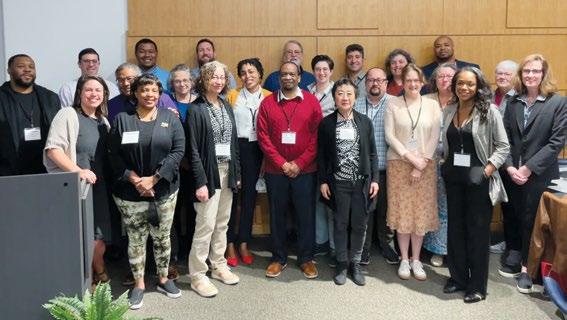

NCLC convened community action agency representatives and advocates for consumers, affordable housing, and racial justice in Atlanta to collaborate on developing solutions to the energy affordability crisis affecting low-income households. Advocates discussed arrearage management, disconnection for nonpayment, and more.
The Atlanta meeting will be one of many as NCLC works to build a strong low-income energy advocacy network of leaders invested in consumer protection. NCLC thanks the Heising-Simons Foundation for its essential support of this critical first gathering! n
Learn more about NCLC’s consumer energy advocacy: nclc.org/issue/energy-utilitiestelecommunications/
“Passing It Down”
continued from page 1
Then, one day, I got a call from the Massachusetts Attorney General’s Office, asking me to apply for a job in the Consumer Protection Division. My law partners and I agreed that the time was right, so I moved to the AG’s office to serve as the Deputy Chief of the Division, and later became the Division Chief before coming to NCLC.
Q: Who have your mentors been and how have they shaped you?
A: NCLC advocates – especially Stuart Rossman, Chi Chi Wu, and Odette Williamson – were some of the first attorneys I met in this field and really helped me understand how to build a career. Attorneys like John Roddy and Elizabeth Ryan were also great role models. Gary Klein, in particular, has been and is my key mentor to this day. He put a ton of time, energy, and effort into teaching me how to be an effective litigator and showed me how much attention it really takes to help someone grow professionally.
Q: What attracted you to the Litigation Director position, and what are your goals for NCLC’s Litigation Project?

A: NCLC has been a constant presence in my career since the beginning, and it felt like a natural next step to have the chance to join this group of dedicated advocates. I want to maintain NCLC’s strong tradition of helping hold private interests accountable and exposing predatory practices that harm consumers.
I’m excited that this job also presents me with an opportunity to help grow and support our consumer law community. I hope to take all the wisdom I’ve received from my own mentors and to pass it down to others, helping bring new people into the practice of consumer law and making our community even bigger and more diverse. n
Learn more about NCLC’s Litigation Project: nclc.org/litigation/
Consumer Impact 9
NCLC advocates and Exchange attendees
NCLC Legacy Society Support That Sustains, Impact That Endures
Generous support from consumer attorneys and allies is an essential element of NCLC’s fight to ensure a fair and level economic playing field for all Americans, especially the most vulnerable among us.
A legacy gift is a charitable contribution from your estate. You plan for and arrange your legacy gift now with the expectation that NCLC will receive your gift after the end of your lifetime. Your legacy gift makes a powerful statement about your ideals and the value you place on economic justice and opportunity. Legacy gifts also provide an invaluable source of support for the future work of NCLC.
Legacy gifts can take a variety of forms, such as a charitable bequest, beneficiary designation, or gift of a retirement account. You can design legacy gifts to accommodate your unique circumstances, and you always have the right to modify your legacy gift in the future, if necessary.
Visit nclc.org/get-involved/ways-to-give/planned-giving to learn more, and please feel free to contact Paul Laurent at plaurent@nclc.org when you’re next thinking about estate planning – whether you have a quick question; are looking for planning resources; or want to discuss gift, estate, or tax planning in-depth.
We’re deeply grateful to all current members of the NCLC Legacy Society and to all considering making NCLC part of your lasting legacy! n
Rand Bragg Retires from NCLC Partners Council: Celebrating a Consumer Champion
NCLC thanks Rand Bragg for his many years supporting NCLC and the consumer law community as he steps down as an active member of NCLC’s Partners Council.
Rand was an early leader in the consumer law field. He began his career helping the United Auto Workers union establish legal aid offices for its members and since then has built a successful private consumer law
NCLC’ers On the Move
Associate Director Lauren Saunders was honored in March by the National Consumers League (NCL) at an event called “Celebrating Women in the Consumer Movement.” The NCL said, “Lauren is a renowned and highly effective expert on issues affecting low-income Americans, including small-dollar loans, predatory lending, banking, fintech, and payment systems.”
Senior Attorney Sarah Bolling Mancini has been appointed by the Consumer Financial Protection Bureau to its Consumer Advisory Board (CAB), where she will provide analysis and advice on consumer finance issues, including
foreclosures, mortgage lending, and credit reporting issues. She was recommended for the Board by Raphael Bostic, President of the Federal Reserve Bank of Atlanta. Sarah is the second NCLC advocate in recent years tapped for this prestigious role, following NCLC Senior Attorney Chi Chi Wu’s prior service on the CAB.
Former Of Counsel Tara Twomey was selected by Attorney General Merrick Garland to serve as Director of the U.S. Trustee Program at the Department of Justice, a key office in protecting consumer debtors against fraud and abuse. Tara has been affiliated with NCLC for 18 years, most recently in an Of
practice. He served as one of NCLC’s first Consumer Law fellows and mentored untold numbers of consumer attorneys. What’s more, he is a longtime contributing author to NCLC’s Fair Debt Collection treatise.
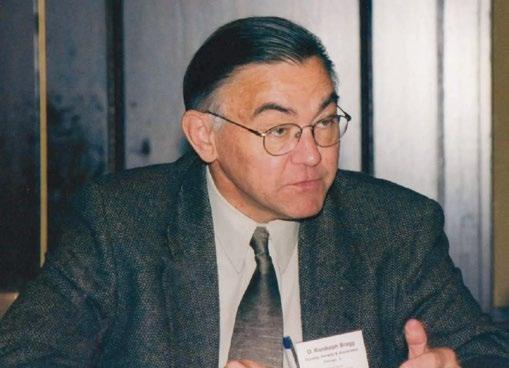
“NCLC is eternally grateful for Rand’s dedication and leadership,” said Rich Dubois, NCLC Executive Director. “We are a better organization because of Rand, and we wish him all the best.” n
Counsel role. She also recently served as the Executive Director of the National Consumer Bankruptcy Rights Center, advancing the rights of consumer bankruptcy debtors.
Nketiah “Ink” Berko will join NCLC in the fall as an Equal Justice Works Fellow. Ink will spend his two-year public interest law fellowship focusing on homeownership issues affecting low-income communities. Ink spent his 2L summer as an intern at NCLC and has previously completed internships focusing on a range of issues including community economic development and fair housing. He is currently finishing his final year at Yale Law School. n
Consumer Impact 10
Rand Bragg
Thank You!
NCLC relies on the generosity of our supporters to advocate for fairness; to litigate for justice; and to educate, train, and support the consumer law community. Space limitations prohibit us from recognizing every supporter by name, but we are tremendously grateful to all who have recently donated to NCLC, including the following individuals and organizations who have made significant contributions in support of our efforts:
$100,000+
Annie E. Casey Foundation
Anonymous
Arnold Ventures
Energy Foundation
Heising Simons Foundation
The Joyce Foundation
JPB Foundation
Kresge Foundation
Massachusetts Legal Assistance Corporation
Oregon Consumer Justice
W. K. Kellogg Foundation
$25,000+
Attorney General’s Fund
The Boston Foundation
Capital One Services
Consumer Litigation Associates, P.C.
Elizabeth Cabraser
Equal Justice Works
Jonathan L. Kravetz
The Klarman Family Foundation
Leonard A. Bennett
Lieff Cabraser Heimann & Bernstein, LLP
Media Democracy Fund
Mintz, Levin, Cohn, Ferris, Glovsky & Popeo, P.C.
Natural Resources Defense Council
ROC USA
RRF Foundation for Aging
Skadden Fellowship Foundation
Tilia Fund
Terrell Marshall Law Group
$10,000+
Adam Levin & Heather McDowell
Dolores Silva Smith
Donovan Litigation Group, LLC
Field Foundation of Illinois
Michael P. Malakoff
Robert M. Bramson
Scott C. Borison
$2,500+
Harvey M. Cohen
Jed Halfon
Jim Campen
Mark H. Leymaster
Michael Chorost & Victoria Nugent
O. Randolph Bragg
Robert W. Murphy
Rural Action Fund
$1,000+
Alex Burke
Amanda Martin
Anne Lougee Anonymous
Arthur Bryant
Bob Belovich
Brian Wolfman
Colin & Francisca Thomas Helmer Charitable Fund
Daniel E. Birkhaeuser
David McMillin
David Ricci
David Yen
Deepak Gupta
E. Michelle Drake
Ernest L. Sarason
Gail Hillebrand
Give Lively Foundation, Inc.
Henry J. Sommer
Irv Ackelsberg
Janet Varnell
James M. Pietz
John Roddy
Jonathan Waisnor
Joshua R. Cohen
Karen Kellett
Kathleen Maher
Kristin Kemnitzer & Adam McNeile
Legal Aid Center of Southern Nevada
Massachusetts Consumers’ Coalition
Matthew Osborne
Michael J. Quirk
Randall H. Brook
Ron Frederick Thomas Cox
Support NCLC Today!
When you give to NCLC, you can be sure that your gift will go a long way.
National charity watchdog Charity Navigator issued its highest marks to NCLC – our 5th consecutive 4-star rating – for financial performance, accountability, and transparency.
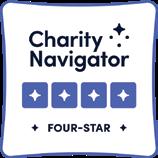
Your support of NCLC has a truly national impact. In the fight for economic justice and a stronger consumer law community nationwide, your support makes all of our work possible, including the following:
n producing essential consumer law treatises, used by advocates and government agencies across the country
n hosting substantive conferences and trainings on the topics of relevance to consumer and advocates
n fighting for pro-consumer reform in Washington and state legislatures
… and much more! n
Give today to have a national impact: nclc.org/donate
NCLC is especially grateful to the initial members of our newly launched 2023 Leadership Circle, who have made high-impact personal gifts to sustain and strengthen NCLC’s work to support the consumer law community and advance economic justice for all.
Adam K. Levin & Heather McDowell
Dolores Silva Smith
Elizabeth Cabraser
Francis Mailman Soumilas, P.C.
Jonathan Kravetz
Leonard Bennett
Michael Donovan
Michael Malakoff
Robert Bramson
Robert Murphy
Ron Frederick
Scott Borison
The Leadership Circle is still in its earliest stages. To learn more, reach out to Paul Laurent, NCLC Director of Leadership Giving at plaurent@nclc.org
Consumer Impact 11
Sponsored by the National Consumer Law Center and the National Association of Consumer Advocates
Meet us in Chicago this fall for the Annual Consumer Rights Litigation Conference (CRLC) & Class Action Symposium!

The CRLC is a comprehensive convening of, by, and for the entire consumer law community, with extensive networking events, substantive engagement opportunities, and
60+ detailed training courses covering every major area of consumer rights law, with sessions built for advocates at different levels of experience – from new attorneys to the most seasoned practitioners.
The Class Action Symposium is for experienced consumer class action practitioners, addressing emerging developments and evolving practices, including noteworthy judicial rulings, evidentiary challenges, proposed rules changes, developments in class administration, and new ethical issues of particular importance in complex litigation cases.
Through NCLC’s Campaign for the Future and its generous donors, private attorneys with less than five years of experience (Next Generation) and all Legal Aid attorneys will receive an automatic 50% scholarship to attend NCLC conferences . This scholarship opportunity automatically lowers the cost of attendance when registering for the conference.
Registration opens this summer. Be on the lookout for the 2023 CRLC brochure in your mailbox! n
Learn more about NCLC/NACA conferences this year: nclc.org/events
National Consumer Law Center
Winthrop
4th
Boston,
Nonprofit Org. US POSTAGE PAID Boston, MA Permit No. 57091
7
Square,
Floor
MA 02110-1245
nonprofit National
Center® (NCLC®)
for economic justice for low-income and other
U.S.
publications,
and
Join the Community This Fall in Chicago!
PAGE 8: Racial Justice - Research & Action for Fair Housing
The
Consumer Law
works
disadvantaged people in the
through policy analysis and advocacy,
litigation,
training.
2023 Consumer Rights Litigation Conference and Class Action Symposium, October 26–29




















